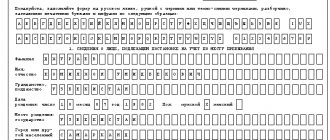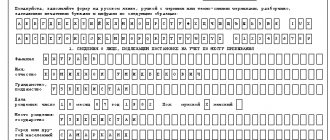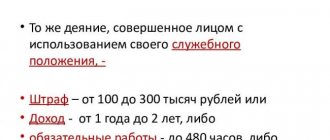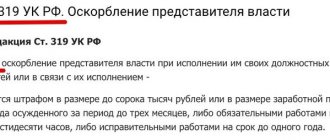Foreign citizens coming to the Russian Federation for long-term residence and earnings must register at their place of stay. Evidence of legality is a stamp in the passport indicating the registration address, which must coincide with the address where the migrant is actually located. Otherwise, it may be considered fictitious. Violation of this rule threatens the expulsion of the migrant from Russia with the subsequent imposition of a ban on entry into the country for a period of 3 to 10 years. But not all migrants can obtain registration legally. In this case, some companies, as well as homeowners, offer to register a migrant in their living space using false documents and without granting the right to live there for a monetary reward. This is how fictitious registration of foreign citizens occurs.
What is fictitious residence permit (registration) of foreign citizens?
Important! Please keep in mind that:
- Each case is unique and individual.
- A thorough study of the issue does not always guarantee a positive outcome. It depends on many factors.
To get the most detailed advice on your issue, you just need to choose any of the options offered:
- Use the online chat in the lower corner of the screen.
- Call: Federal number: +7 (800) 511-86-74
The concept of fictitious registration (aka fictitious registration) is not disclosed in Russian legal terminology. Neither the criminal nor the administrative code establish criteria for determining the illegality of registration. The objective side is characterized by the provision of false information. The subjective part presupposes direct intent.
Important! Registration and registration are the same thing, only the word “registration” is used in everyday life, and the term “registration” is used in legislative and executive documents.
According to Federal Law No. 5242-1, fictitious registration includes the following actions:
- registration of a citizen who has citizenship of another country in a residential building without providing him with the opportunity to live at the address indicated in the document;
- provision of false documentation required for registration to the migration service authorities.
An offense can be committed both by the owners or tenants of housing themselves, and by officials for material reward. All established facts of obtaining registration by illegal means fall into this category of offenses. For many owners of apartments and houses, this becomes a kind of business. There are a lot of people who want to register. After all, its presence presupposes the receipt of many benefits that citizens of the Russian Federation enjoy. This includes official employment, obtaining a medical insurance policy, and admission to universities. This is what a certificate of temporary registration of a person who arrived in the Russian Federation from another country looks like.
Important! It is not necessary that a citizen receives a fictitious registration with malicious intent. This can happen accidentally, for example, when contacting dubious companies. But in 90% of cases, illegal migrants know that they are committing an offense.
Administrative
The concept of administrative responsibility is more familiar to our ears when it comes to the fictitiousness of registration actions.
In the majority of identified cases, we are actually talking about administrative penalties. They are applied in accordance with the norms of the Code of Administrative Offenses of the Russian Federation, and their specific dimensions are provided for in Chapter 18.
Despite the increased penalties, it is quite difficult to prove the registration is fictitious. In most cases, this happens due to the presence of irreconcilable conflicts between neighbors. To confirm a fact, you need either a confession by the perpetrators themselves of the crime, or a collected evidence base.
Terms of liability
Administrative penalties are expressed in two possible options:
- Fine. It depends directly on the object to which it is applied and other aggravating circumstances.
- Administrative expulsion or deportation.
Only foreign citizens can be deported from the Russian Federation, so this administrative measure applies to guests of Russia and only if their temporary registration has expired or they were not registered anywhere in Russia at all. But if it is discovered that a foreigner is registered in one place and lives in another, then he can only be fined.
Amount of fine
There are two penalty lines that are applied separately to each side of the detected violation. As a rule, the registered person bears a significantly lower level of liability than the one who registered him.
A citizen who has a place of registration, but does not live at this address, will pay a fine of 2 to 5 thousand rubles. The specific amount is determined individually and depends on the region of the Russian Federation. The receiving party is subject to significantly more serious amounts, the amount of which depends on the status - an individual or a legal entity. A fine is imposed for violating the registration rules:
- From 2,000 to 5,000 rubles, if we are talking about individuals.
- From 25,000 to 55,000 rubles when the guilt of the official is established.
- From 250,000 to 750,000 rubles, if the receiving party was a legal entity.
The indicated fine amount is presented per person.
How is the verification process carried out?
Only a judicial authority has the right to recognize a registration as fictitious. The basis for opening a case is a statement from an employee of the Migration Service or a local police commissioner. But often the initiators are vigilant neighbors. After reviewing the application, the FMS employee performs the following actions:
- checks the actual stay of the migrant at his place of registration;
- finds out how many citizens are actually registered in a residential area using the all-Russian database;
- asks neighbors about the actual residence of these citizens, checks their place of work;
- checks registration documents;
- if necessary, interviews all persons living in the premises.
If a FMS employee suspects that a foreign citizen has provided false documentation or false information during registration, then a request is sent to the internal affairs bodies of the Russian Federation to clarify and verify the authenticity of the information. Next, an investigation is carried out, and either the case is sent to court, or if there is no evidence of a crime, the investigation is terminated. This is how the migrant’s documents are checked.
Is it possible to check the authenticity of information about it?
To do this, you need to contact the FMS and the Police. If it is found that a person is only nominally registered in a certain living space, and the owner of the apartment or the landlord is in cahoots with him, then the registration will be declared illegal and a criminal case will be initiated.
You can check the authenticity of any person’s registration yourself, but only authorized bodies can cancel the registration and open a case.
If law enforcement agencies have a complaint against you, you can prove the authenticity of your registration at your place of residence by proving that your documents are genuine and you actually live in the living space you occupy. This must also be approved by the owner of the living space; without his testimony in your favor, you may be deprived of your registration.
Types of punishment
Although there is no such concept as fictitious registration in Russian legislation, this does not mean that one should not be held accountable for it. Violations may result in administrative and, in some cases, criminal penalties. Several parties will be held accountable for the offense committed. These are officials who allowed illegal registration to be issued using their official position. A wide range of people can be held criminally liable. These could be the owners of sanatoriums, hotels, medical institutions, and employees who registered illegal immigrants in these residential premises. This also includes any owner or tenant of living space who registers one or more persons on the square meters of his apartment or household. The foreigner himself is also charged.
Note! Registration is considered illegal only if there is evidence that the official is aware of the crime he is committing.
If previously in judicial practice only administrative punishment was applied, namely a fine for fictitious registration of foreign citizens, then from 2013 to the present, criminal liability has also been imposed. Such measures had to be applied due to the huge flow of illegal migrants pouring from nearby countries due to the unstable economic and political situation, as well as due to military operations. Which led to the emergence of private companies that process registration for newly arrived migrants illegally and at great expense. The legislation of the Russian Federation contains an article that provides for punishment for the illegal registration of migrants in residential premises, and the illegal registration of such persons with the Federal Migration Service. This is article 322.2 of the Criminal Code of the Russian Federation.
Administrative punishment
Administrative penalties for fictitious registration are discussed in the following table:
| Article of the Code of Administrative Offenses of the Russian Federation | What is the punishment for? |
| № 19. 15.1 | Lack of a Russian registration stamp in the passport, living in a living space with an expired registration. |
| Code of Administrative Offenses of the Russian Federation Article 18.8. Violation by a foreign citizen or stateless person of the rules of entry into the Russian Federation or the regime of stay in the Russian Federation, part 1.1 | Lack of necessary documentation confirming the right of a foreigner or stateless person to reside in the Russian Federation. Failure to provide timely information to the Ministry of Internal Affairs in the event of loss of such documents. |
| № 19.27 | Submitting false documentation to the migration authorities or not providing any documentation. |
Criminal liability
In the Criminal Code, liability for illegal registration of foreigners is regulated by Article 322.2 of the Criminal Code of the Russian Federation. And also Article 327 of the Criminal Code of the Russian Federation, which deals with the production and sale of counterfeit documents. Administrative and criminal penalties include:
- Penalties. For the illegal registration of a person who is a citizen of a foreign state and does not have Russian citizenship, the law provides for a fine of 100,000 to 500,000 rubles or the person’s income for 3 years. Moreover, the migrant will be charged a fine of 5,000 rubles, and the person who registered him will be charged 100-500 thousand.
- Forced labor for up to 3 years.
- Imprisonment up to 3 years. The crime also includes giving a bribe for illegal actions.
Important! A person who has committed such an offense is entitled to a reduced sentence if he cooperates in the investigation process.
Responsibility
What is the penalty for violating the registration rules at the place of residence? Criminal liability. This is stated in Article 322.2 of the Criminal Code of the Russian Federation.
Nothing good awaits the violator - he will have to pay a fine - up to five hundred thousand rubles. Or - forced labor - up to three years.
Add to this the deprivation of the right to conduct certain activities - and it becomes clear that the game is not worth the candle; it is much easier to do everything legally.
Moreover, the law does not distinguish between foreigners and citizens of the Russian Federation in this regard. You will learn about the liability for fictitious registration of a foreign citizen from our article.
Find out also what the parents face for the absence or late registration of their child.
Punishment for the owner or tenant of residential premises
The receiving party that offers its illegal services faces liability for fictitious registration of foreign citizens. Initially, owners of residential space are fined or assigned community service, that is, articles of the Code of Administrative Offenses are applied. Legal entities or ordinary citizens who have already received administrative penalties for such an act, but continue to engage in illegal activities, are brought to criminal liability. It’s a paradox, but the owner of an apartment or house where a migrant previously lived and was registered can receive punishment. This is possible if a temporarily registered tenant moves out, and the owner or tenant of the premises does not apply to the FMS to deregister him. After the expiration of the temporary registration, it is automatically canceled, and the owner, through the court, will be forced to pay a fine or be forced to perform corrective work.
What threatens homeowners?
Fictitious “registration” of foreign citizens can become a source of significant problems for Russian home owners. Responsibility for this violation is more significant for them compared to a similar punishment for foreigners whom they register with them. So, if a fine of 5 thousand rubles is collected from a foreign citizen “registered” in Moscow, then the person who registered him risks paying the state 500 thousand (according to the law, the fine “fork” is 100-500 thousand rubles. )
Another method of punishment is primarily aimed at homeowners - correctional labor. They are usually assigned to property owners in the Russian Federation who have violated the law. An important question is how to renew the registration of a foreign citizen. This procedure may be necessary for foreigners who have entered the Russian Federation visa-free.
To renew registration, the receiving party (i.e., the homeowner who has “registered” a citizen of another country) is required to submit a package of documents (originals and copies) to the Department of Internal Affairs of the Ministry of Internal Affairs no later than a week before the end of the current registration. This package includes:
- petition for extension of “registration” (application),
- foreigner's migration card,
- visitor's passport,
- documents that can confirm the need for a foreign citizen’s continued stay in Russia.
According to the law, 7 days are provided for registration renewal. You must submit documents for its extension in person (as opposed to the initial submission, which can be done by mail). For late registration, the homeowner is required to pay a fine. Its size is 2-5 thousand rubles. The amount of penalties is regulated by the Code of Administrative Offenses of the Russian Federation (Article 18.8).









